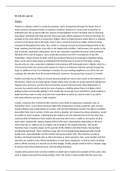P4, M4, D4- unit 43
Malaria
Malaria is a disease, which is carried by parasites, and is transported through the blood. One of
many common symptoms known to malaria is anaemia. Anaemia is a term used to describe an
individual who has an abnormally low volume of haemoglobin in their red blood cells (or that they
have fewer red blood cells than normal). There are many effects anaemia can have on the body. An
example of the many effects of anaemia is fatigue, which is simply because when there is a reduced
amount of red blood cells in the body, there is also a reduced amount of oxygen molecule being
transported throughout the body. Thus, there is a reduced amount of energy being provided to the
body, implying that the body is less able to do simple daily activities. Furthermore, this results to the
lack of aerobic respiration taking place, and in fact anaerobic respiration becomes more prevalent
(because of the lack of oxygen). Since anaerobic produces less ATP in comparison to aerobic
respiration, a large amount of lactic acid is also produced because of anaerobic respiration taking
place. Lactic acid is what makes an individual feel tired because it is toxic for the body, causing
muscle ache etc. Also, anaerobes respiration only produces ATP during glycolysis. I digress; there is a
24 hour period after the contact with malaria to result in an infection and then spread through the
body. In addition to this, if an individual is treated, the surrounding neighbours are still at risk and
could get the infection from the treated individual. However, this period lasts around 2-3 months.
Malaria currently has an effect on society because people are much more aware of the existence of
the disease, which can be easily spread. People today (who are able to) avoid malaria by taking their
hygiene more seriously, and also the fact that they ensure that they know what medications or
vaccines hey would need to take in the case of going to a holiday where there is a higher risk of
getting malaria and possibly getting it. This would also encourage more scientists to study malaria in
depth and thus make it a duty to ensure the medications in which are used to treat it, are both
extremely effective and up to a high standard.
Usually, someone who is infected with malaria is more likely to experience symptoms such as
headaches, fever, a sore throat and even high body temperature. Having symptoms such as these
would untimely have a bad impact on society, and infected individuals wouldn’t be able to complete
task within their role in society. In the case where a teacher, for instance has these symptoms, would
be unable to teach students- implying that the students are also affected due to the fact that they
could possibly fall behind on their studies because they don’t have a stable or no teacher at all to
teach them. Statistically, malaria targets children the most, meaning that depending on the area
which they live in, children are at a higher risk of death by the malaria infection. This would
therefore have a massive impact on the parents of the children and other family, leaving them
emotionally distressed. There could be a huge risk of such people being diagnosed with mental
health issue, and potentially commit suicide (increasing suicide rate). This could be a result of
families not being financially able to afford therapist or other specialist. Also, some families will find
that they are unable to also afford medications to ease those symptoms, as well as some not being
able to afford vaccines as it may be out of their budget. Finally, people could be left in a deeper stage
of poverty than they previously were, and becoming homeless.
Usually when parents have lost their children to death (by to malaria for example (in this case)), they
tend to replace their grief by having another child. This means if other people feel the same way,





